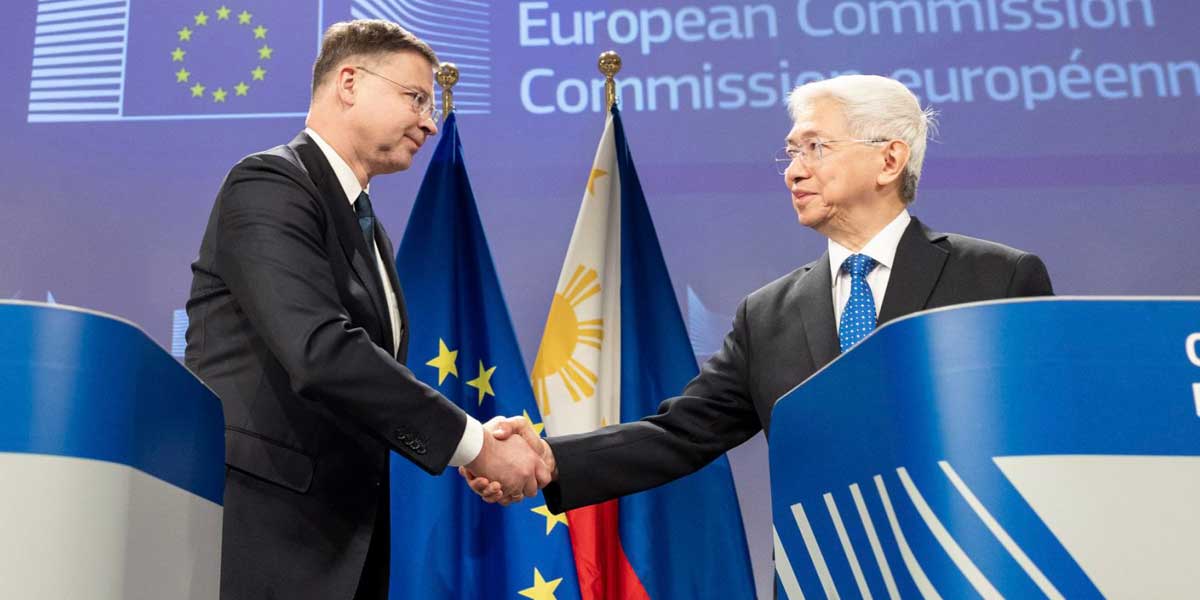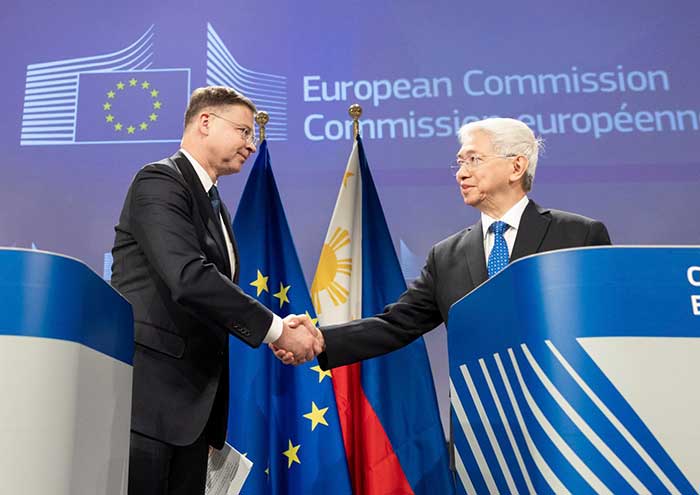

Department of Trade and Industry (DTI) Secretary Fred Pascual and European Commission Executive Vice President and Trade Commissioner Valdis Dombrovskis on March 18 announced the resumption of the Philippines-European Union Free Trade Agreement (PH-EU FTA) negotiations.
“Strengthening economic engagement with the EU remains a priority for the Philippines. As one of the country’s largest trading partners and sources of investment, we have worked diligently to enhance our ties with the EU, including high-level exchanges over the past two years between President Ferdinand Marcos Jr. and EU Commission President Ursula Von der Leyen,” Secretary Pascual said.
“The conditions are right to take our trade relations to the next level. Trade between the EU and the Philippines is already strong and has been growing at an impressive pace over the past decade,” EVP Dombrovskis added.
In 2023, the EU emerged as the country’s 5th largest trading partner with total trade amounting to USD 16.16 billion (8.1% share to PH total trade), the 6th export market with USD 8.37 billion, and the 6th import supplier valued at USD 7.79 billion.
Similarly, the EU has been a major foreign investment partner, with total foreign direct investments reaching USD 29.16 million in 2022 and USD 63.99 billion in 2023.
A comprehensive stocktaking exercise conducted by the Department and the European Commission, from September to December 2023 laid the groundwork for the resumption of the negotiations.
The exercise aimed to understand respective ambitions and explore possible elements of the FTA, acknowledging the evolving global economic landscape since the first two negotiating rounds in 2016 and 2017.
“We aim for an ambitious, balanced, and comprehensive FTA with the EU. Our approach is guided by the Philippine Development Plan 2023-2028, directing us to advance purposive, assertive, and forward-looking FTAs,” emphasized Pascual.
Over the past decade, the Philippines’ trade engagement with the EU has primarily occurred within the EU Generalised System of Preferences Plus (GSP+) offering zero tariffs on more than six thousand tariff lines or 66% of all EU tariff lines.
The GSP+ has significantly benefitted numerous communities, including General Santos, Davao, Cebu, and economic zones situated in cities such as Laguna, Cavite, and Batangas. Moreover, it catalyzed foreign investment, particularly in electronics, agriculture, processed foods, apparel, craft goods, travel goods, and home appliances.
The PH-EU FTA aims to provide enhanced market access for goods, services and investments, going beyond the benefits of the GSP+. By committing to rules and higher standards, the FTA will enhance competitiveness and foster sustainable, inclusive growth and development in the Philippines.
“A modern, comprehensive and values-based free trade agreement with this fast-growing economy would open new opportunities for both sides, strengthen our supply chains, and promote sustainable trade. It would also deepen ties with a key partner in the burgeoning Indo-Pacific region,” said EVP Dombrovskis.
The FTA will ensure mutual market access and diversify supply chains, offering more opportunities for professionals and service providers. Furthermore, it will attract more EU investments, in key sectors such as infrastructure, digital technology, research, renewable energy, and green transition.
“As we look ahead, the Philippines is committed to deepening economic ties and fostering cooperation with the EU across emerging trade areas like critical raw materials, climate change, environmental sustainability, labor, and good governance,” Pascual affirmed.
The resumption of the FTA negotiations coincides with celebration of 60 years of diplomatic relations between the Philippines and the EU.